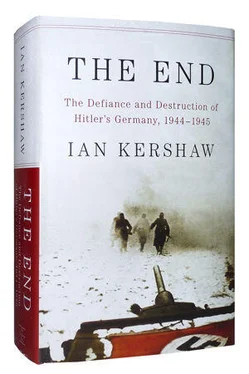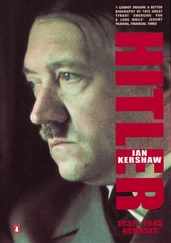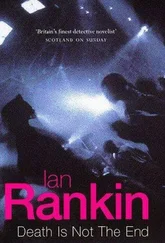60. BStA, MA 106696, report of the RPvNB/OP, 10.3.45. Colonel Curt Pollex, based in Berlin, noted that Soviet atrocities, exploited by German propaganda, were causing ‘total panic’.—BA/MA, N712/15, NL Pollex, Auszüge aus Briefen, fo. 14, 23.1.45. For the mood of panic spread by refugees and fear of the Russians, see also Victor Klemperer, Ich will Zeugnis ablegen bis zum letzten , vol 2: Tagebücher 1942–1945 , ed. Walter Nowojski and Hadwig Klemperer, Darmstadt, 1998, pp. 645–6, 649–60 (25.1.45, 29.1.45).
61. VB , South German edn., 9.2.45.
62. BfZ, Sammlung Sterz, Josef E., 21.1.45.
63. Jörg Echternkamp (ed.), Kriegsschauplatz Deutschland 1945: Leben in Angst—Hoffnung auf Frieden. Feldpost aus der Heimat und von der Front , Paderborn, 2006, pp. 138–9 (28.1.45) and p. 268 nn. 282–6. The letter was returned, marked ‘Wait for New Address’. Whether the soldier survived is not known.
64. BStA, MA 106695, report of the RPvOB, 9.2.45.
65. BStA, MA 106696, report of the RPvOF/MF, 8.2.45.
66. Ursula von Kardorff, Berliner Aufzeichnungen 1942–1945 , pb. edn., Munich, 1981, pp. 228 (25.1.45), 229 (30.1.45).
67. Ruth Andreas-Friedrich, Schauplatz Berlin: Ein deutsches Tagebuch , Munich, 1962, p. 124 (22.1.45).
68. LHC, Dempsey Papers, no. 249, pt. II, p. 9 (in English).
69. IWM, Memoirs of P. E. von Stemann, p. 193.
70. Das letzte halbe Jahr: Stimmungsberichte der Wehrmachtpropaganda 1944/45 , ed. Wolfram Wette, Ricarda Bremer and Detlef Vogel, Essen, 2001, pp. 219–20, 229 (23.1.45, 1.2.45).
71. Andreas-Friedrich, p. 126 (31.1.45).
72. Das letzte halbe Jahr , p. 219 (23.1.45), pp. 228–9 (1.2.45).
73. IWM, Memoirs of P. E. von Stemann, p. 197.
74. Das letzte halbe Jahr , pp. 235–6 (7.2.45).
75. Echternkamp, p. 129 (20.1.45).
76. IWM, Memoirs of P. E. von Stemann, p. 200.
77. IWM, ‘Aus deutschen Urkunden 1935–1945’, unpub. documentation, n.d. ( c . 1945–6), pp. 66–7, 276–8.
78. Das letzte halbe Jahr , pp. 218 (22.1.45), 236 (7.2.45).
79. BfZ, Sammlung Sterz, Gisela K., 3.2.45.
80. BfZ, Sammlung Sterz, Luise G., 3.2.45.
81. Heinrich Breloer (ed.), Mein Tagebuch: Geschichten vom Überleben 1939–1947 , Cologne, 1984, p. 228 (27.1.45).
82. For a good description in one region, see Jill Stephenson, Hitler’s Home Front: Württemberg under the Nazis , London, 2006, pp. 304–12.
83. BfZ, Sammlung Sterz, Gefr. Heinrich R., 23.1.45.
84. BfZ, Sammlung Sterz, Sold. Willy F., 30.1.45.
85. BfZ, Sammlung Sterz, Fw. Hugo B., 2.2.45.
86. BfZ, Sammlung Sterz, Lt. Thomas S., 23.1.45.
87. BfZ, Sammlung Sterz, Hptm. Emerich P., 20.1.45.
88. BfZ, Sammlung Sterz, Uffz. Hans ——, 24.1.45.
89. BfZ, Sammlung Sterz, O’Gefr. Otto L., 24.1.45.
90. BfZ, Sammlung Sterz, Gren. Kurt M., 30.1.45.
91. Quoted Andreas Kunz, Wehrmacht und Niederlage: Die bewaffnete Macht in der Endphase der nationalsozialistischen Herrschaft 1944 bis 1945 , Munich, 2007, p. 243, and see also, for racial stereotypes, pp. 269–70.
92. BA/MA, MSg2/2697, fo. 88, diary of Lieutenant Julius Dufner, 25.1.45.
93. NAL, WO219/1587, fo. 860, SHAEF, Directorate of Army Psychiatry Research Memorandum 45/03/12, January 1945.
94. Kunz, pp. 299–300.
95. BA/MA, N245/3, NL Reinhardt, ‘Kalenderblätter 1945’, fo. 81 (14.1.45); N245/2, Briefe, fo. 41 (15.1.45); N245/15, Generalleutnant Otto Heidkämper (former Chief of Staff of Army Group Centre), ‘Die Schlacht um Ostpreußen’ (1953), fo. 32; Guderian, pp. 382–3; DRZW , 10/1 (Lakowski), pp. 536–7.
96. BA/MA, N245/3, NL Reinhardt, ‘Kalenderblätter 1945’, fo. 82 (16–17.1.45); N245/15, Heidkämper, fos. 40–43.
97. BA/MA, N245/2, NL Reinhardt, Briefe, fo. 41 (19.1.45).
98. BA/MA, N245/2, NL Reinhardt, Briefe, fo. 41 (20.1.45).
99. BA/MA, N245/2, NL Reinhardt, Briefe, fo. 41 v(21.1.45); N245/3, NL Reinhardt, ‘Kalenderblätter 1945’, fos. 82–3 (20–21.1.45); N245/15, Heidkämper, fos. 53–7.
100. The above account relies, except where otherwise stated, on BA/MA, N245/3, NL Reinhardt, ‘Kalenderblätter 1945’, fos. 83–4 (22–7.1.45); N245/2, NL Reinhardt, Briefe, fos. 41–2 (22.1.45, 26.1.45); N245/15, Heidkämper, fos. 68–72, 76–87; N24/39, ‘Erinnerungen von General d.I. a.D. Friedrich Hoßbach’, typescript (May 1945), pp. 45–6, 68. See also Friedrich Hoßbach, Die Schlacht um Ostpreußen , Überlingen, 1951, pp. 51–73; Guderian, pp. 400–401; Dieckert and Grossmann, pp. 94–5, 110-18; DZW , 6, p. 511.
101. e.g. BA/MA, RH21/3/730, fos. 3–6, ‘Auskünfte Gen.Major Mueller-Hillebrand (Chef des Stabes) über den Einsatz der 3. Pz. Armee in Ostpreußen, Sept. 1944–Feb. 1945’ (1955); ‘Auszug aus einem Bericht von Oberst i.G. Mendrzyk O.Qu. bei der 3. Panzer-Armee’.
102. Quoted Schwendemann, ‘Das Kriegsende in Ostpreußen’, p. 98.
103. Schwendemann, ‘Tod zwischen den Fronten’, p. 43. I am most grateful to Dr Schwendemann for the reference to the source for these comments, BA/MA, RH20/4/617, unfoliated, Notizen über Ferngespräche 14–25.1.45, Gesprächsnotizen vom 24.1.45 (Hoßbach addressing leading officers at 16.00 hours that day, and speaking to Reinhardt that evening at 22.15 hours), and to Dr Jürgen Förster for obtaining for me a copy of the document.
104. BA/MA, N712/15, NL Pollex, Auszüge aus Briefen, fo. 12, 22.1.45.
105. N24/39, NL Hoßbach, ‘Erinnerungen’, pp. 46–7; Hoßbach, p. 70. That Rendulic´ had a less than complete comprehension of the situation in East Prussia when he arrived there seems clear. He had as recently as 17 January been appointed by Hitler as Commander-in-Chief of Army Group Courland, and had been in Courland no more than twelve hours when, on 26 January, he was suddenly informed that he had to take over the command of Army Group North, besieged in East Prussia.—Lothar Rendulic´, Gekämpft, Gesiegt, Geschlagen , Wels, 1952, pp. 331–2, 336.
106. Guderian, pp. 400–401. Rendulic´, pp. 337–55, provides a description of his period, a little over six weeks, in command in East Prussia, until 12 March, though it contains only a few inconsequential lines on Hoßbach’s dismissal on p. 343.
107. Guderian, p. 394.
108. Hastings, p. 283; Roland Kaltenegger, Schörner: Feldmarschall der letzten Stunde , Munich and Berlin, 1994, pp. 265–6; Siebel-Achenbach, pp. 59, 71–2. Hitler had initially intended Field-Marshal Model to take over the command. It was decided, however, that he was urgently needed in the west, so the command was given to Schörner.— TBJG , II/15, pp. 135 (16.1.45), 138 (17.1.45).
109. Quoted DRZW , 10/2 (Kunz), p. 39.
110. BA/MA, N60/74, NL Schörner, ‘Tragödie Schlesien, März 1945’, fo. 2 (1958).
111. BAB, NS6/353, fos. 157–8, Bormann, Bekanntgabe 28/45, Ungehorsam und falsche Meldungen, containing Keitel’s order in appendix; also IfZ, Fa-91/4, fo. 1069.
112. Himmler’s command had, it seems, already been agreed some days earlier, in the main, according to Goebbels, because ‘a firm hand’ was needed to turn troops ‘flooding back’ from the path of the Soviets into new fighting units. Goebbels even suggested making Himmler Commander-in-Chief of the Army, to relieve Hitler of this duty, but Hitler was unwilling to go so far and stated that Himmler first had to prove he could master operational command.— TBJG , II/15, pp. 165 (20.1.45), 181 (22.1.45), 195 (23.1.45).
113. DZW , 6, p. 513.
114. IWM, FO645/155, interrogations of Karl Dönitz, 30.9.45, p. 5; 2.10.45, p. 2 (in English).
Читать дальше












